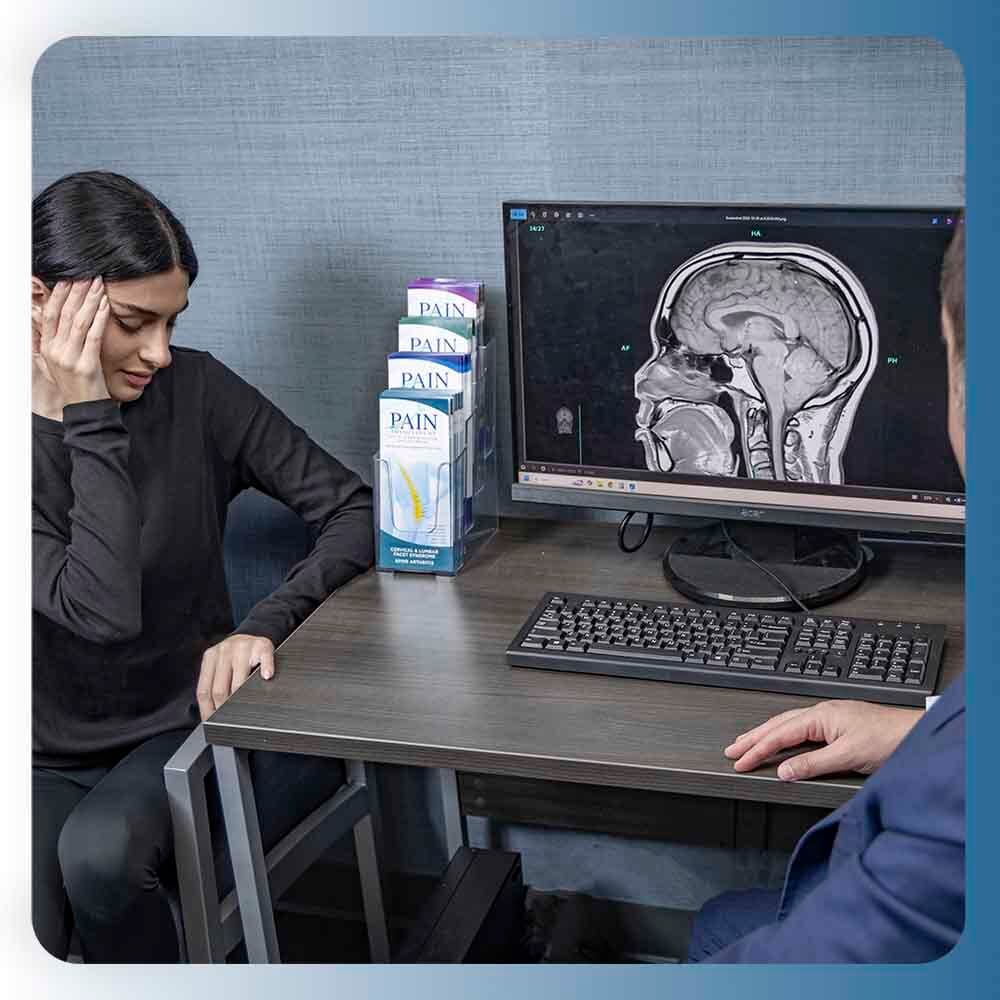The information provided on this website is intended for general informational purposes only. It does not constitute definitive treatment advice. For any questions or issues related to pain management, it is crucial to consult a medical professional. A thorough evaluation is essential for an accurate diagnosis and treatment plan.
×On This Page
Headaches are one of the most common problems affecting one-third of men and half of women. Everyone has experienced a headache at some time in their life. It can affect anyone, regardless of age, gender, and race. This type of pain can be a sign of emotional distress or it can be an outcome of a medical disorder, such as migraines, high blood pressure, depression, or anxiety. If you experience chronic migraines it can affect your work or school performance.
 Our pain management center offers accurate diagnoses and treatment options of various headache problems in New York. Additionally, our best Brooklyn migraine specialists aim to provide our patients with the highest level of attention and care. Our team of top doctors is ready and eager to help with any kind of headache problems you might experience. Our pain management center has all the necessary equipment and top-rated specialists needed to provide the highest level of quality service and effective treatment of any kind of headache treatment.
Our pain management center offers accurate diagnoses and treatment options of various headache problems in New York. Additionally, our best Brooklyn migraine specialists aim to provide our patients with the highest level of attention and care. Our team of top doctors is ready and eager to help with any kind of headache problems you might experience. Our pain management center has all the necessary equipment and top-rated specialists needed to provide the highest level of quality service and effective treatment of any kind of headache treatment.
According to headache specialists, a migraine is a powerful type of headache, which is normally accompanied with nausea, vomiting, and sensitivity to light. A recent study showed that more than 36 million Americans experience migraines. Women encounter this problem 3 times more than men. The onset ranges between the ages of 10 to 40.
The two main types of migraine headaches include:
Aura refers to the symptoms that signal that a migraine is coming. These symptoms typically start one hour before the pain and last for 15 minutes to an hour.
Migraine doctors believe that people may experience a mix of symptoms. Main symptoms of migraine headaches are listed below:

The majority of migraines last for about 4 hours but more serious ones can last for more than 3 days. Some people might get migraine headaches once or twice a year, while others might experience them every few days.
Migraine specialists are not completely sure about the causes of chronic headaches. However, a potential cause could be imbalances in certain brain chemicals. Your genes could also encourage migraine headaches.
Despite the fact that researchers have not been able to outline specific causes of this problem yet, certain risk factors for migraines include:
Headache doctors say that symptoms of chronic headaches appear a minimum of 15 days out of every month and for at least three consecutive months. The main symptoms of chronic migraine include:
Keep in mind that a chronic migraine should be associated with at least two of the aforementioned symptoms for a minimum of eight days in a month.
Headache remedy and advice from your regular doctor may not be enough to relieve your pain. If you have not found the solution for your headache, it’s time to visit a specialist. A specialist will assess your symptoms, detect the cause of the problem, and establish a detailed plan for treatment.
A headache specialist has a deeper understanding of this type of problem and has access to new cutting-edge treatments, which a regular doctor will not have. It is vital to follow your specialist’s advice because the overuse of pain relief medication can lead to rebound medication.
Before visiting a headache doctor, you need to settle down a few key details. You need to keep in mind that it is important to work with your doctor to get relief. Key preparation steps include:
Be aware that your pain relief highly depends on your communication with a headache specialit. Make sure to go to the appointment with as much information as possible.
It is important to have the proper headache treatment to achieve pain relief. The type of headache and its underlying cause critically influence treatment for chronic head pain. The majority of occasional migraine headaches can be easily treated with medications selected personally for you by our specialists.
Chronic cluster headache can be managed with the use of daily prescribed medications such as tricyclic antidepressants. You can also make use of alternative therapies, which strive to reduce stress. They include massage therapy, acupuncture, Botox injections, occipital nerve block, trigger point injections.
If you constantly experience migraine headaches, our clinic is ready to help you manage this problem. Specialists of Pain Physicians NY have the expertise needed to make a personalized migraine prophylaxis plan in order to prevent this type of chronic pain.
Migraine headaches can cause serious discomfort and restrict you from performing everyday activities. Make sure to be in contact with your body so you can filter the information that it provides.
If you encounter severe headaches, which cannot be managed, make an appointment with a pain management specialist. A doctor will make the headache treatment process smoother, much faster, and personalized.
Pain Management Brooklyn
2279 Coney Island Ave, Brooklyn, NY 11223
(718) 998 – 9890